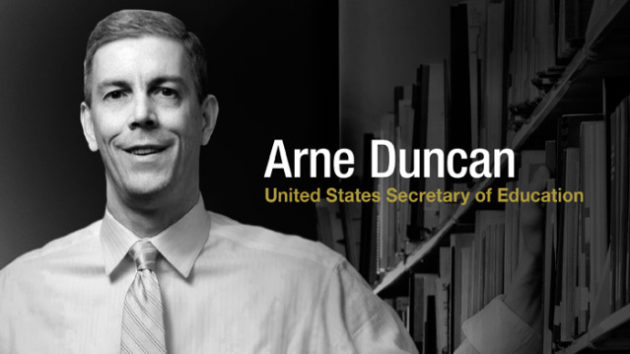Arne Duncan Plays the Common Core Distancing Game
On April 2, 2014, Louisiana has witnessed the lame demonstration of “Common Core distancing” from the governor (Bobby Jindal) who signed the state onto “the standards” (CCSS) in 2009– before they were written.
In 2010, US Secretary of Education Arne Duncan accepted Louisiana’s CCSS MOU (memorandum of understanding) despite the majority of Louisiana school districts rejecting the idea.
Like Jindal, Duncan has begun playing the CCSS Distancing Game. He first did so when when Indiana appeared to be the first state to drop CCSS, in March 2014.
On March 15, 2014, Duncan publicly stated that “states are free to completely discard Common Core.”
This is the same Duncan who told newspaper editors in June 2013 how to favorably report on CCSS.
This is the same Duncan who insulted “White suburban mothers” and blamed them for CCSS resistance in November 2013, then offered no apology.
Now, on April 8, 2014, Duncan has told the House Appropriations Subcommittee that he “just likes high standards”:
“I’m just a big proponent of high standards. Whether they’re common or not is secondary,” he told members of the House appropriations subcommittee that works on health, education, and other related issues. [Emphasis added.]
And at this point, Duncan falls back on the “or other common standards” clause included in the Race to the Top (RTTT) application. You see, the House Appropriations Committee questioned Duncan on the apparent requirement that states agree to CCSS in order to compete for RTTT money.
Duncan states that “zero” federal grant money is contingent upon CCSS since states could have chosen to form their own “common standards.”
Duncan is drawing on a clause in the 2010 Blueprint for Elementary and Secondary Education Act (ESEA) reauthorization:
States may either choose to upgrade their existing standards, working with their 4-year public university system to certify that mastery of the standards ensures that a student will not need to take remedial coursework upon admission to a postsecondary institution in the system, or work with other states to create state-developed common standards that build toward college- and career-readiness.
Never mind that the federal government would still be controlling state standards by ultimately deciding if the evidence offered is “good enough” for state receipt of federal money.
The author of the April 8, 2014, EdWeek article, Michele McNeil, isn’t convinced of Duncan’s “zero” response:
But when it comes to competitive grants, the answer is more complicated than “zero.”The administration’s original $4 billion Race to the Top program awarded 40 points to states for developing and adopting common standards. All 12 of those winners have adopted the standards, and have not backed off. What’s more, a separate, $360 million Race to the Top contest to fund common tests was based on the premise that states needed help developing such assessments based on the common standards. But technically, aligning to the common core wasn’t required (you just probably weren’t going to win without it).
Duncan’s testimony, which didn’t contain such nuances, illustrates the fine line the department continues to walk between supporting states as they implement the common core, and not giving critics ammunition to cry “federal overreach.” [Emphasis added.]
Duncan (and Obama) will be crossing that “fine line” should they make CCSS a definitive component of the FY2015 ESEA reauthorization blueprint, a direction that the Cato Institute believes the Obama administration plans to follow.
Proponents of CCSS are fond of saying that “federal overreach” is an unsubstantiated complaint.
Not so, according to ESEA Subpart Two,Section 9527(c)(1):
(c) PROHIBITION ON REQUIRING FEDERAL APPROVAL OR CERTIFICATION OF STANDARDS-
(1) IN GENERAL- Notwithstanding any other provision of Federal law, no State shall be required to have academic content or student academic achievement standards approved or certified by the Federal Government, in order to receive assistance under this Act. [Emphasis added.]
However, given the Obama/Duncan love of education privatization, I don’t think the ultimate goal is federal control of American “common,” public education.
I think the ultimate Obama/Duncan goal is for-profit education company control of American education– but no longer public.
For-profit control of American education can only lead to the end game of not educating all American children– just the “common” ones who might be exploited for profit.
The children of privilege– Obama’s children and Duncan’s children– will be exempt from “common” privatization betrayal.


